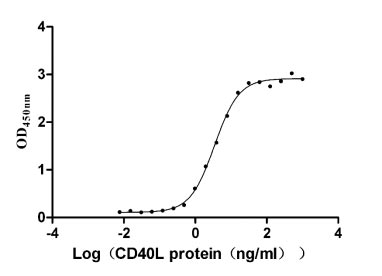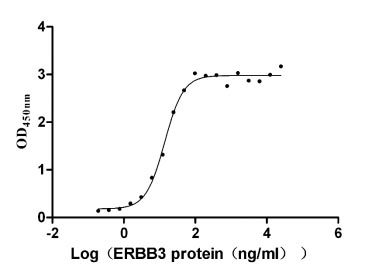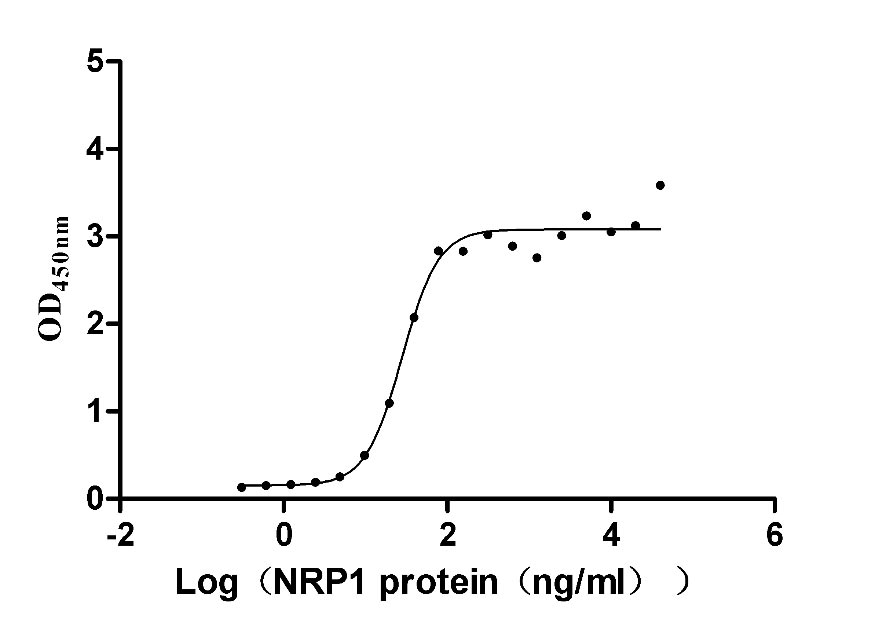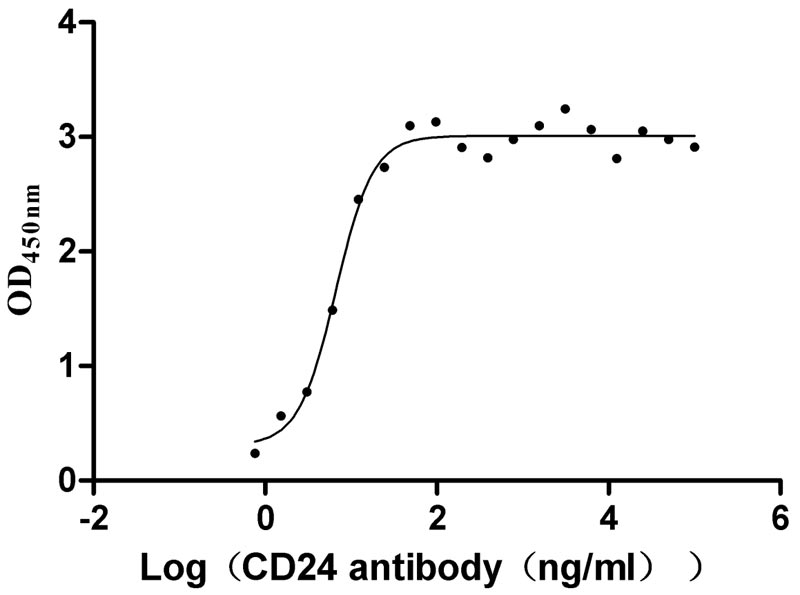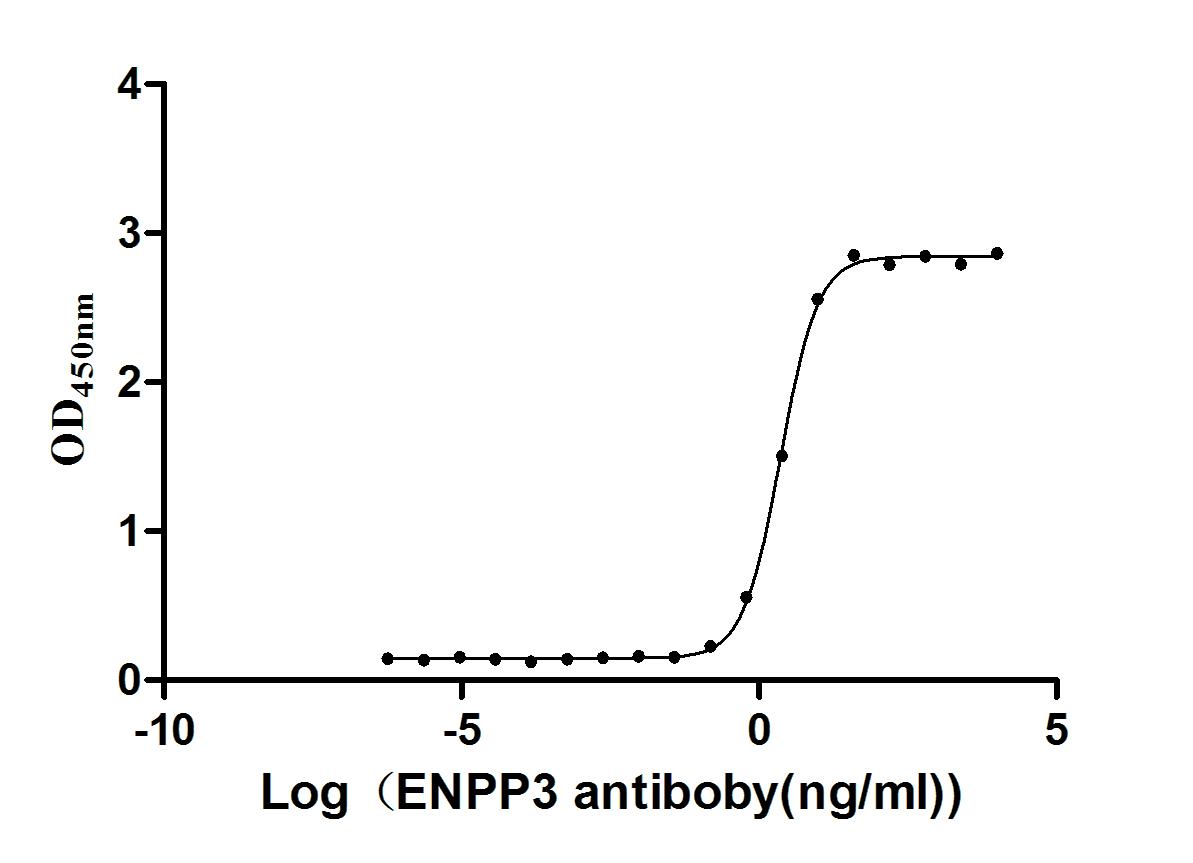Recombinant Mouse Forkhead box protein P2 (Foxp2)
-
中文名称:小鼠Foxp2重组蛋白
-
货号:CSB-YP008842MO
-
规格:
-
来源:Yeast
-
其他:
-
中文名称:小鼠Foxp2重组蛋白
-
货号:CSB-EP008842MO
-
规格:
-
来源:E.coli
-
其他:
-
中文名称:小鼠Foxp2重组蛋白
-
货号:CSB-EP008842MO-B
-
规格:
-
来源:E.coli
-
共轭:Avi-tag Biotinylated
E. coli biotin ligase (BirA) is highly specific in covalently attaching biotin to the 15 amino acid AviTag peptide. This recombinant protein was biotinylated in vivo by AviTag-BirA technology, which method is BriA catalyzes amide linkage between the biotin and the specific lysine of the AviTag.
-
其他:
-
中文名称:小鼠Foxp2重组蛋白
-
货号:CSB-BP008842MO
-
规格:
-
来源:Baculovirus
-
其他:
-
中文名称:小鼠Foxp2重组蛋白
-
货号:CSB-MP008842MO
-
规格:
-
来源:Mammalian cell
-
其他:
产品详情
-
纯度:>85% (SDS-PAGE)
-
基因名:Foxp2
-
Uniprot No.:
-
别名:Foxp2; Forkhead box protein P2
-
种属:Mus musculus (Mouse)
-
蛋白长度:Full length protein
-
表达区域:1-714
-
氨基酸序列MMQESATETI SNSSMNQNGM STLSSQLDAG SRDGRSSGDT SSEVSTVELL HLQQQQALQA ARQLLLQQQT SGLKSPKSSE KQRPLQVPVS VAMMTPQVIT PQQMQQILQQ QVLSPQQLQA LLQQQQAVML QQQQLQEFYK KQQEQLHLQL LQQQQQQQQQ QQQQQQQQQQ QQQQQQQQQQ QQQQQQQQQQ QHPGKQAKEQ QQQQQQQQLA AQQLVFQQQL LQMQQLQQQQ HLLSLQRQGL ISIPPGQAAL PVQSLPQAGL SPAEIQQLWK EVTGVHSMED NGIKHGGLDL TTNNSSSTTS STTSKASPPI THHSIVNGQS SVLNARRDSS SHEETGASHT LYGHGVCKWP GCESICEDFG QFLKHLNNEH ALDDRSTAQC RVQMQVVQQL EIQLSKERER LQAMMTHLHM RPSEPKPSPK PLNLVSSVTM SKNMLETSPQ SLPQTPTTPT APVTPITQGP SVITPASVPN VGAIRRRHSD KYNIPMSSEI APNYEFYKNA DVRPPFTYAT LIRQAIMESS DRQLTLNEIY SWFTRTFAYF RRNAATWKNA VRHNLSLHKC FVRVENVKGA VWTVDEVEYQ KRRSQKITGS PTLVKNIPTS LGYGAALNAS LQAALAESSL PLLSNPGLIN NASSGLLQAV HEDLNGSLDH IDSNGNSSPG CSPQPHIHSI HVKEEPVIAE DEDCPMSLVT TANHSPELED DREIEEEPLS EDLE
-
蛋白标签:Tag type will be determined during the manufacturing process.
The tag type will be determined during production process. If you have specified tag type, please tell us and we will develop the specified tag preferentially. -
产品提供形式:Lyophilized powder
Note: We will preferentially ship the format that we have in stock, however, if you have any special requirement for the format, please remark your requirement when placing the order, we will prepare according to your demand. -
复溶:We recommend that this vial be briefly centrifuged prior to opening to bring the contents to the bottom. Please reconstitute protein in deionized sterile water to a concentration of 0.1-1.0 mg/mL.We recommend to add 5-50% of glycerol (final concentration) and aliquot for long-term storage at -20℃/-80℃. Our default final concentration of glycerol is 50%. Customers could use it as reference.
-
储存条件:Store at -20°C/-80°C upon receipt, aliquoting is necessary for mutiple use. Avoid repeated freeze-thaw cycles.
-
保质期:The shelf life is related to many factors, storage state, buffer ingredients, storage temperature and the stability of the protein itself.
Generally, the shelf life of liquid form is 6 months at -20°C/-80°C. The shelf life of lyophilized form is 12 months at -20°C/-80°C. -
货期:Delivery time may differ from different purchasing way or location, please kindly consult your local distributors for specific delivery time.Note: All of our proteins are default shipped with normal blue ice packs, if you request to ship with dry ice, please communicate with us in advance and extra fees will be charged.
-
注意事项:Repeated freezing and thawing is not recommended. Store working aliquots at 4°C for up to one week.
-
Datasheet :Please contact us to get it.
靶点详情
-
功能:Transcriptional repressor that may play a role in the specification and differentiation of lung epithelium. May also play a role in developing neural, gastrointestinal and cardiovascular tissues. Can act with CTBP1 to synergistically repress transcription but CTPBP1 is not essential. Plays a role in synapse formation by regulating SRPX2 levels.
-
基因功能参考文献:
- findings also indicate that Foxp2 helps to regulate strength and length of hind limbs and maintenance of joint cartilage and intervertebral discs, which are all anatomical features that are susceptible to adaptations for bipedal locomotion. PMID: 30104377
- Foxp2 has a putative HuR binding sites in the 3' UTR. Phosphorylation sites on HuR act in post-transcriptional regulation of Foxp2. PMID: 27383233
- The expression levels of Foxp2 were high in the posterior region and low in the anterior region of the thalamic primordium. PMID: 27384060
- Here, the s show that the telencephalic preoptic area is comprised of distinct progenitor pools complementarily marked by the transcription factors Dbx1 and Foxp2. As determined by molecular and electrophysiological criteria this embryonic parcellation predicts postnatal medial subnucleus of the amygdala inhibitory neuronal subtype identity. PMID: 28244870
- Eesults indicate a role of FoxP2 differential expression in cell morphology control of the vertebrate telencephalon. PMID: 26163006
- that Foxp2-Mef2C signaling is critical to corticostriatal circuit formation PMID: 27595386
- Sumoylation of forkhead box P2 in neonatal mouse cerebellum regulates Purkinje cell development and motor functions and vocal communication, demonstrating evidence for sumoylation in regulating mammalian behaviors. PMID: 27009683
- The Foxp2 gene is critical for normal vocal behavior in juvenile and adult mice. PMID: 26980647
- This study demonstrated that after middle cerebral artery occlusion mice demonstrate profoundly impaired socially evoked USVs and suppression of the language-associated transcription factor, Forkhead box protein 2 (Foxp2). PMID: 26889967
- mice with Foxp2 mutations displayed quantitative differences in ultrasonic vocalizations as compared to wild-types PMID: 26566793
- Foxp2 was elevated early after stroke (at 6h), but significantly decreased 24h after injury in both the nucleus and the cytoplasm; neuronal Foxp2 expression increased in stroke mice compared to sham animals 4 weeks after injury PMID: 25644653
- arkypallidal GPe neurons originate from lateral/caudal ganglionic eminences, express the transcription factor FoxP2, fire at low rates during rest, and encode movements with robust increases in firing. PMID: 25843402
- Results suggest that Foxp2 regulates multiple aspects of neuronal development in the embryonic forebrain PMID: 24453072
- Foxp2 in Purkinje cells may pertain to the brain network engaged in ultrasonic vocalization (USV) modification, including USV duration, but not USV production PMID: 24607928
- results indicate that FOXP2 is critical for the function of striatal circuits. PMID: 21876543
- These results support the idea that FoxP2 regulates the transition from neural precursors to transit-amplifying progenitors and ultimately neurons, and shed light upon the molecular changes that might contribute to evolution of the mammalian cortex. PMID: 23283338
- Results uncover a new layer of control of Foxp2 expression that may be required for proper neuronal maturation. PMID: 22874921
- Foxp2(R552H) knock-in mouse pups exhibit impaired ultrasonic vocalization and poor dendritic development in Purkinje cells. PMID: 21985339
- FoxP2 is highly expressed in virtually all Purkinje cells in cerebellum at and before postnatal day 6, except for those in the flocculus and small parts of the nodulus. PMID: 21935935
- our study of etiological Foxp2 mutations in mice has revealed novel cognitive deficits that go beyond motor functions and extend to auditory-motor association learning. PMID: 22412993
- Results suggest that although the Foxp2 transcription factor does not target Cadm1, Cadm1 at the synapses of Purkinje cells and parallel fibers is necessary for ultrasonic vocalization (USV) function. PMID: 22272290
- these observations suggest that Foxp2 may regulate ultrasonic vocalization by associating with CtBP in Purkinje cells PMID: 22133810
- Foxp2 regulates putative target gene expression and neurite outgrowth in neurons in the developing brain. PMID: 21765815
- Foxp2 is not essential for the innate production of emotional vocalizations with largely normal acoustic properties by mouse pups. PMID: 20132318
- The Foxp2 protein is expressed in the growing distal edge of airway epithelium. When the bronchiolus elongates, Foxp2 suppresses CC10 expression PMID: 20553735
- Foxp2 mRNA is most highly expressed in developing and mature basal ganglia and is also observed in the cerebral cortex, cerebellum (Purkinje neurons), and thalamus. PMID: 12687690
- Altered ultrasonic vocalization in mice with a disruption in the Foxp2 gene. PMID: 15983371
- This review describes investigations of FoxP2 in mice and humans used for discovery of the neural bases of vocal learning and language. PMID: 17035521
- Data show that direct interaction between Foxp2 and Nkx2.1 inhibits Nkx2.1 DNA-binding and transcriptional activity and suggest a mechanism for down-regulation of SP-C during transition of AT2 cells to an AT1 cell phenotype. PMID: 18239190
- Ultrasonic vocalization impairment in Foxp2 (R552H) knockin mice is related to speech-language disorder and abnormality of Purkinje cells. PMID: 18287060
- R552H heterozygotes display significant deficits in species-typical motor-skill learning, accompanied by abnormal synaptic plasticity in striatal and cerebellar neural circuits. PMID: 18328704
- mutation causes deficits in motor-skill learning and abnormal properties of neural circuits that contribute to these skills PMID: 18430631
- FOXP2 has a role in speech and language [review] PMID: 19304338
- the R552H mutation uncovers possible roles for Foxp2 in the development and/or function of the auditory system. PMID: 19596273
- These findings identify roles for two differentially expressed genes, Zic4 and Foxp2, in the development of the principal auditory relay nucleus, the medial geniculate nucleus, and principal visual relay nucleus, the lateral geniculate nucleus PMID: 19864579
- FOXP2/foxp2 is expressed in several structures in developing human/mouse brain including cortical plate, basal ganglia, thalamus, inferior olives and cerebellum. These data suggest a conserved mammalian role in development of motor-related neural circuits PMID: 12876151
显示更多
收起更多
-
亚细胞定位:Nucleus.
-
组织特异性:Highest expression in lung. Lower expression in spleen, skeletal muscle, brain, kidney and small intestine.
-
数据库链接:
KEGG: mmu:114142
STRING: 10090.ENSMUSP00000031545
UniGene: Mm.332919
Most popular with customers
-
Recombinant Human Tumor necrosis factor receptor superfamily member 5 (CD40), partial (Active)
Express system: Mammalian cell
Species: Homo sapiens (Human)
-
Recombinant Human Receptor tyrosine-protein kinase erbB-3 (ERBB3), partial (Active)
Express system: Mammalian cell
Species: Homo sapiens (Human)
-
Recombinant Human Neuropilin-1 (NRP1) (Active)
Express system: Mammalian cell
Species: Homo sapiens (Human)
-
Recombinant Human Glucagon receptor (GCGR), partial (Active)
Express system: Mammalian cell
Species: Homo sapiens (Human)
-
Recombinant Human Signal transducer CD24 (CD24)-Nanoparticle (Active)
Express system: Mammalian cell
Species: Homo sapiens (Human)
-
Recombinant Rat Intestinal-type alkaline phosphatase 1 (Alpi) (Active)
Express system: Mammalian cell
Species: Rattus norvegicus (Rat)
-
Express system: Mammalian cell
Species: Homo sapiens (Human)
-
Recombinant Human B- and T-lymphocyte attenuator(BTLA), partial (Active)
Express system: Mammalian cell
Species: Homo sapiens (Human)


